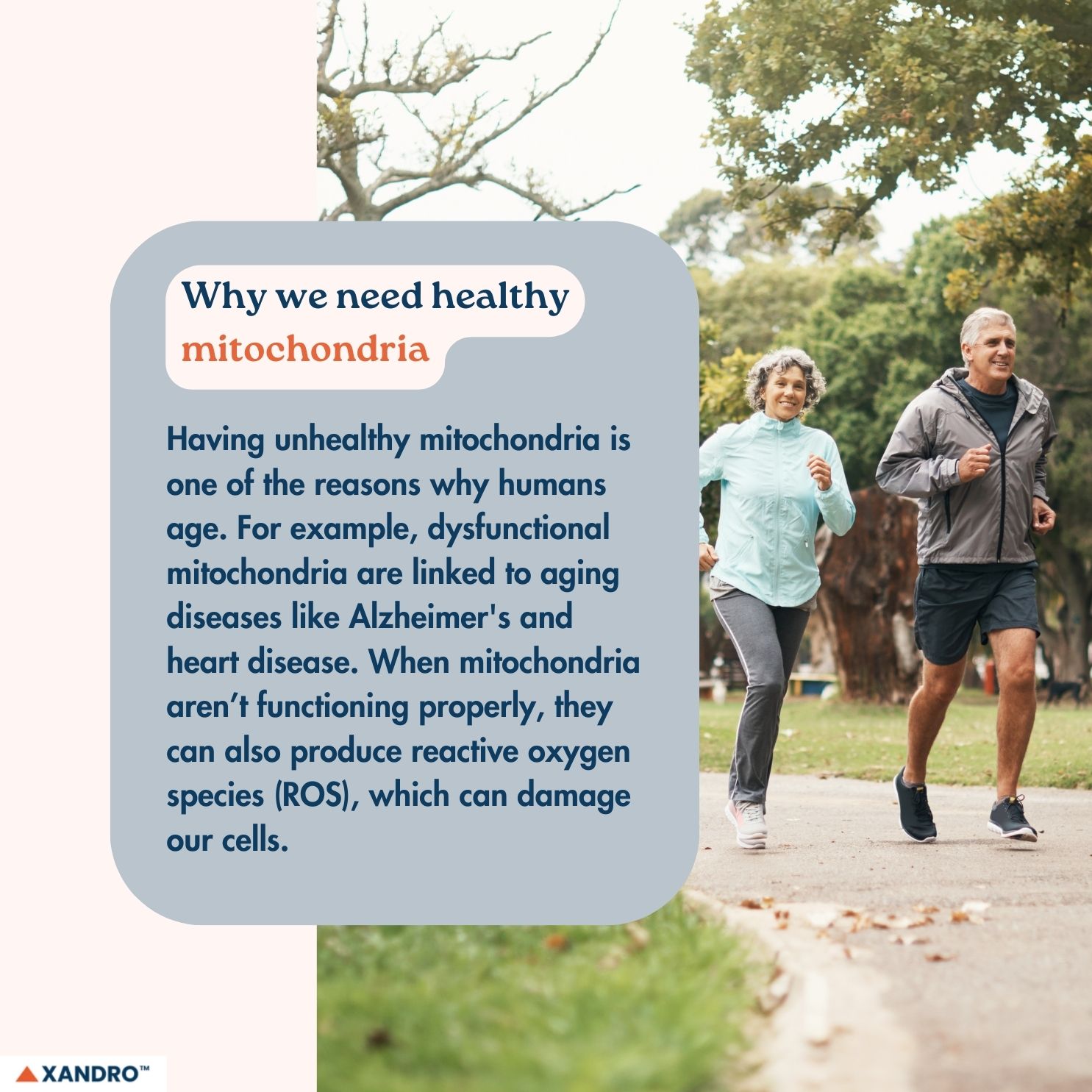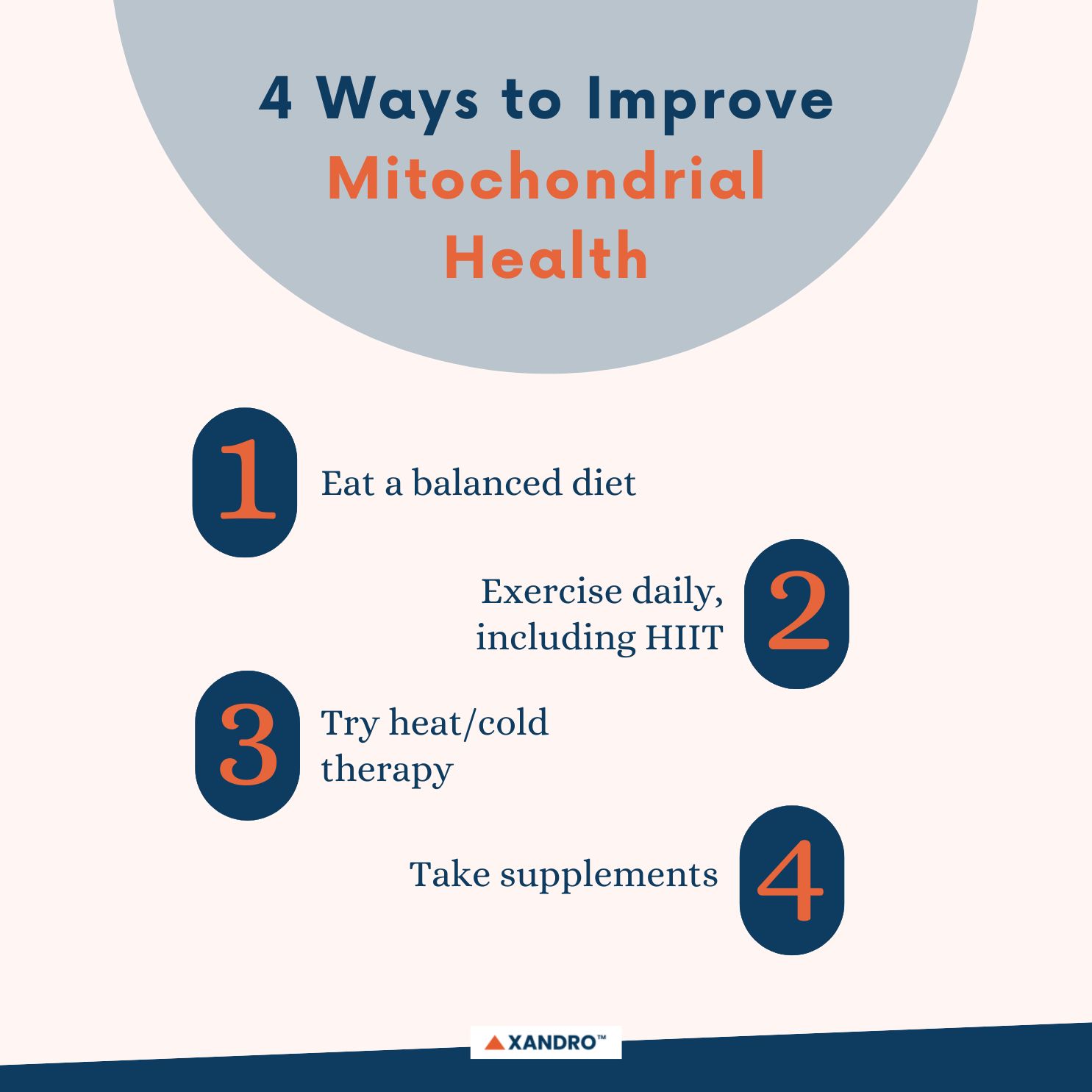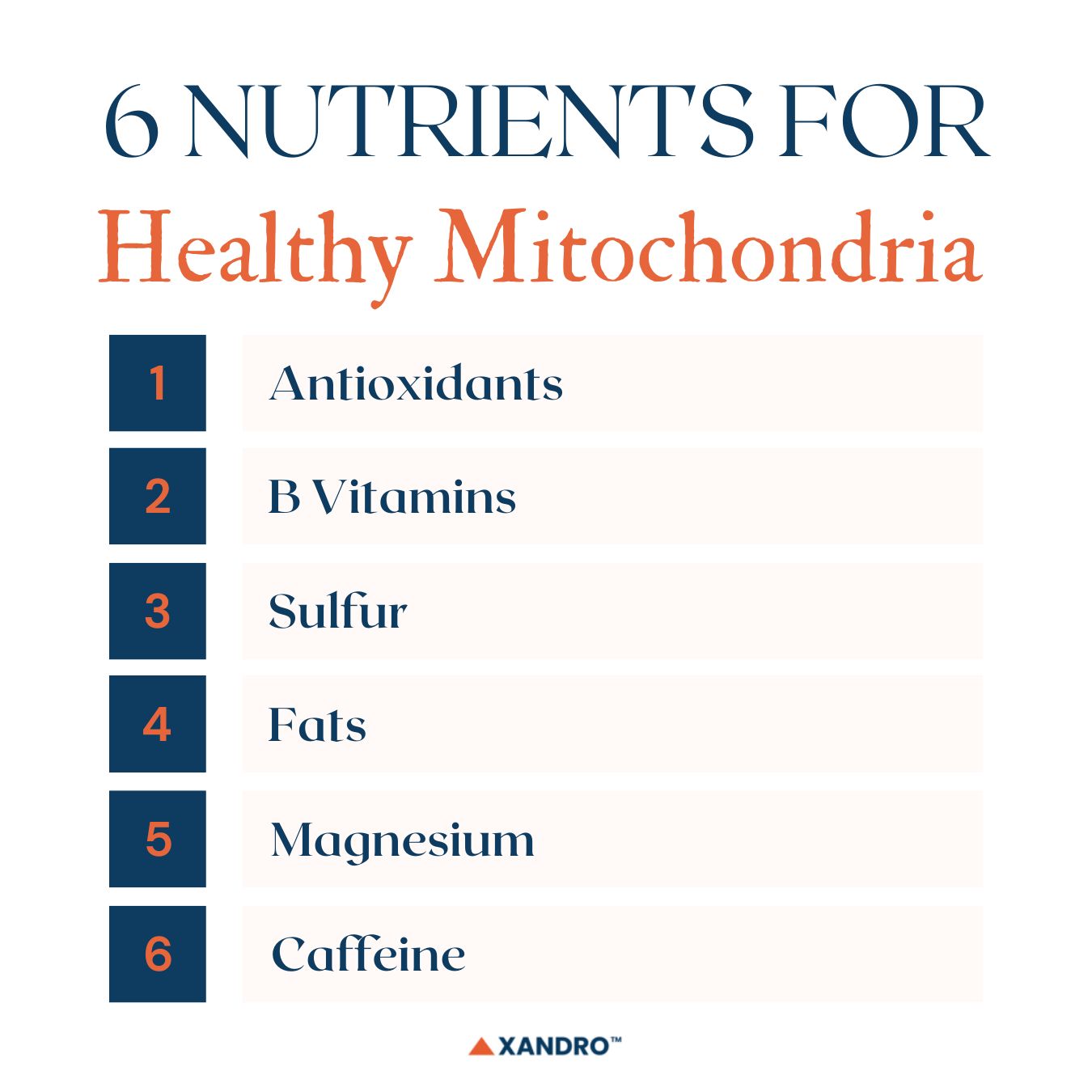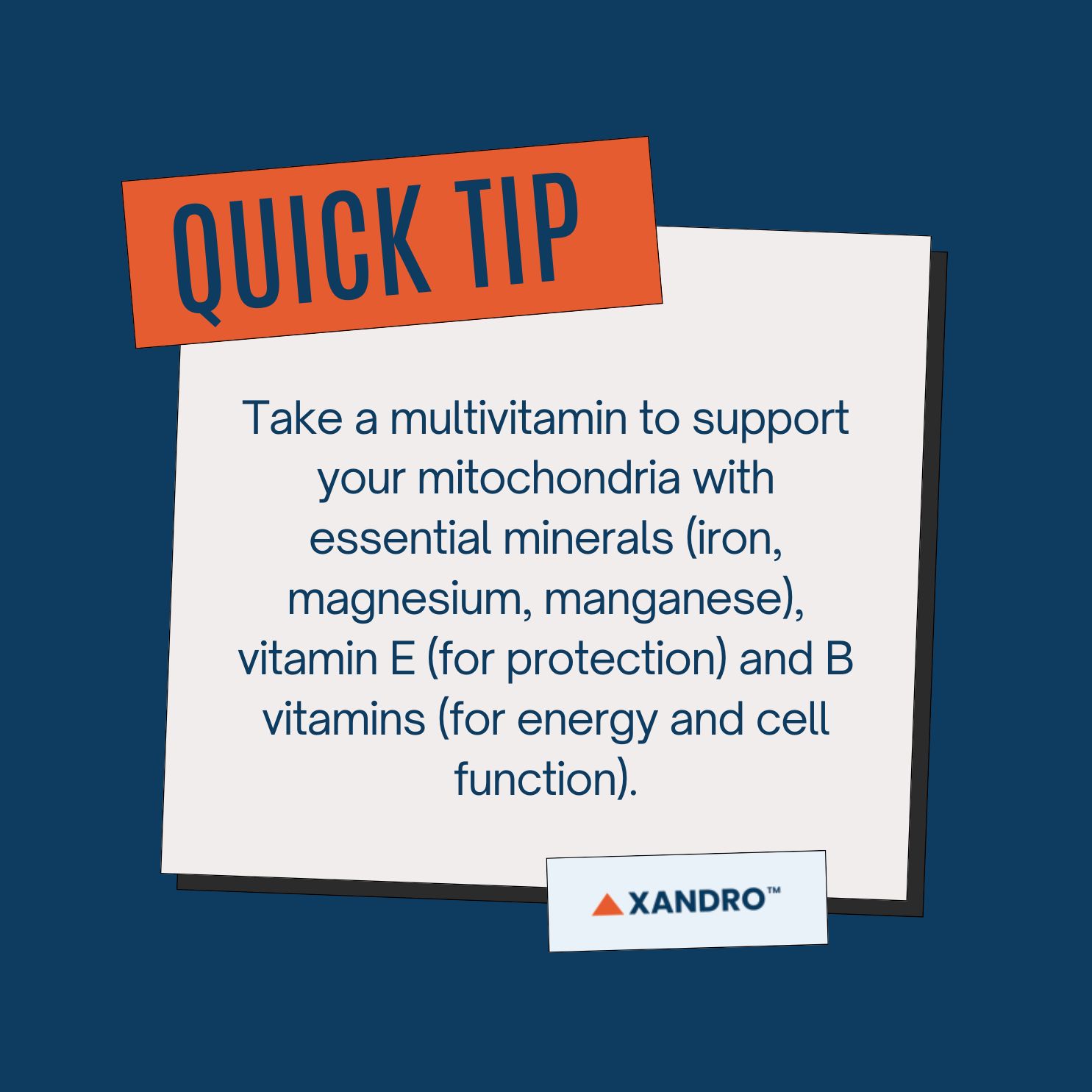How can I improve my mitochondrial health?
17th Jul 2024
All About Mitochondrial Health: Nutrients, Supplements and Aging
Mitochondria. The ‘powerhouse of the cell.’
They’re something we learn about in science at school, but unless you continue to study biology in university, they’re something we forget all about.
This article will cover these important aspects of life and how crucial they are to human aging, plus, how to improve mitochondrial health.
Jump there now:
- What Does Mitochondrial Health Mean?
- How Can I Improve My Mitochondrial Health?
- What Foods Are Good for The Mitochondria?
- Supplements for Mitochondrial Health
Mitochondria, known as the cell's ‘powerhouses,’ convert food into energy stored as adenosine triphosphate (ATP), which is needed for cell functions. They also regulate cell growth and death.
So, what is so important about mitochondria health?
Healthy mitochondria allow for proper energy production, which is incredibly important for overall tissue and organ health. When mitochondria are healthy, they also produce fewer harmful byproducts, reducing cell damage.
Having unhealthy mitochondria is also one of the reasons for why humans age. For example, dysfunctional mitochondria are linked to aging diseases like Alzheimer's and heart disease. When mitochondria aren’t functioning properly, they can also produce reactive oxygen species ( ROS), which can damage our cells.
This is why maintaining mitochondria health can prevent or delay these conditions and aid cell repair. Scientists are also exploring ways to enhance mitochondrial function to combat aging.

Further Reading: Learn more about the science behind aging in our article on Longevity Pathways
Mitochondrial diseases are genetic conditions that impair the mitochondria's ability to produce energy, affecting various body parts like the brain, muscles, heart, kidneys and nerves. There’s no cure, but treatments can prevent severe complications. These diseases include MELAS, LHON, Leigh syndrome, KSS and MERRF. Symptoms can vary widely and may appear at any age, often affecting multiple organs.
Mitochondrial diseases are inherited from one or both parents or can occur randomly — some are passed down exclusively from the mother due to mitochondrial DNA. Secondary mitochondrial dysfunction can be caused by other diseases like Alzheimer's, muscular dystrophy and cancer, but this is different from genetic mitochondrial diseases.
What are 5 symptoms of mitochondrial disease?
Symptoms include:
- Muscle weakness, pain or low muscle tone
- Impaired vision or hearing
- Developmental delays, poor growth or cognitive issues
- Gastrointestinal issues, such as diarrhoea, constipation or vomiting
- Breathing problems, swallowing difficulties, migraines, seizures or fainting
Mitochondrial diseases are hard to diagnose due to their wide-ranging symptoms affecting multiple organs. There’s no single test for diagnosis, so seeing specialists is essential, where they will review your medical and family history, do a series of bodily tests as well as DNA testing.
As you can see, having dysfunctional mitochondria can cause important bodily functions to start falling apart, so you might be wondering how to stop mitochondrial aging.
It’s all about fixing your habits and leading a healthier life. Here are some ways you can help protect your mitochondria:
Eat a Balanced Diet
As you will see below, there are certain foods you can eat that your mitochondria need to create energy properly, such as healthy fats. Make sure to consume a diet full of vitamins, minerals and antioxidants to protect your mitochondria as well as to ensure all your bodily functions have the ingredients they need to work. You can also use fasting and calorie restriction to boost mitochondria and longevity — read more here.
Exercise Daily
Did you know that you/r body produces its weight in ATP daily, which increases dramatically during exercise — hence why you should exercise daily!
Try to exercise for at least 30 minutes each day. One study found that your cells create more proteins that help our mitochondria produce energy when you exercise, and while this looked at HIIT exercise, it goes to show just how important aerobic exercises like swimming, walking and cycling are. Strength training can also increase ATP production, even in those with mitochondrial damage.
Get Enough Sleep
Sleep is incredibly important as when we sleep, the body clears out waste and toxins that build up during the day. This helps your mitochondria work properly.
Further Reading: What Does Sleep Do To My Body?
Reduce Toxin Exposure
Mitochondria are highly susceptible to toxins due to their metabolic activity, so minimise exposure. For example, certain drugs, along with persistent organic pollutants, heavy metals, air pollution and cigarette smoking are all toxic to mitochondria.
Use Heat Therapy
Heat therapy, such as saunas or heating pads, may boost your mitochondrial health. Research shows that warming muscles can increase the number and function of mitochondria, improving your energy levels and performance even without exercise. Heat therapy also offers various health benefits, including reduced risks of cardiovascular disease and detoxification through sweating.
Cold Therapy
Cold showers or ice baths may also boost mitochondrial health. Cold exposure can increase mitochondrial numbers and reduce damage from reactive oxygen species. Benefits include improving muscle recovery, increased brown fat (boosting metabolism) and fewer illnesses. Try ending a hot shower with one minute of cold water or taking a brief cold plunge or ice bath but be cautious of extremely cold water to avoid cold shock and other risks.
Take Supplements
Alongside the above three lifestyle changes, you can take supplements that help reduce oxidative stress and promote mitochondrial growth. More on that below.
Genetics also play a role, but focusing on these areas can significantly improve mitochondrial health.

Mitochondria are vulnerable to nutrient deficiencies, toxins and oxidative damage, with oxidative stress from leaked oxygen and high-energy electrons is a major cause of damage. Other factors linked with higher mitochondrial damage include:
- Oxidants leaked while ATP is produced
- Aging (accumulated oxidative damage to mtDNA)
- Genomic susceptibility (especially ApoE4)
- Toxic metals
- Persistent organic pollutants (POPs)
- Many prescription drugs (among the worst are acetaminophen, aspirin, antibiotics, AZT, methamphetamine, cocaine, grisepfulvin, indomethacin, l-DOPA, NSAIDs and statins)
- Alcohol
There is no direct mitochondrial health test for measuring mitochondrial ATP production, but several indirect tests can help you check your mitochondrial health. Blood tests for lactate and pyruvate can indicate dysfunction, although they’re sensitive to errors and only show issues when dysfunction is severe. Urinary organic acid analysis can also identify specific enzyme problems in the citric acid cycle, while the 8-OHdG urine test can estimate mtDNA damage and predict cancer risk by measuring DNA damage.
We need a range of nutrients for mitochondrial health. These include:
- Antioxidants: blueberries and pomegranate are some of the foods full of antioxidants, which prevent free radical damage. They’re one of the best ways to boost mitochondria. Try our Xandro’s POM-Q10, a longevity pomegranate supplement!
- B Vitamins: These help start up enzymes in the mitochondria that help to produce energy and help with optimal cell function. Beef is a source of all the B vitamins.
- Sulphur: Cruciferous vegetables like cabbage, broccoli and cauliflower contain sulphur which helps to remove toxins from our cells and reversing damage.
- Fats: Fats are needed in our diets, such as through extra-virgin olive oil, butter and salmon, as the protective membranes around our cells are made up of fats. By eating a diet with fats and oils, we can help mend these structures and maintain our immune defences.
- Magnesium: Needed for hundreds of functions in our body, including our mitochondria using it to make ATP, our main course of cell energy. You can get magnesium from foods such as avocado and spinach. Get your hands on Xandro’s Magnesium Glycinate supplement, a highly absorbable form of magnesium to boost your levels!
- Coffee: A link between coffee and mitochondria has been found, where caffeine helps to in the movement of a regulatory protein in mitochondria, helping improve their function and protect cardiovascular cells from damage. It may also improve mitochondrial biogenesis in skeletal muscle.
A mitochondrial health diet full of these nutrients will help you naturally boost your mitochondrial health.
If you’re struggling to get a wide range of vitamins and nutrients in your diet, you can also take mitochondrial health supplements!

So, what are the best supplements for mitochondrial health?
Since ATP can't be stored, mitochondria must constantly produce it, taking up to 25% of cell volume. This process requires key nutrients like riboflavin, niacin, CoQ10, iron, magnesium and carnitine.
Let’s go over a range of vitamins, compounds and supplements available that act as mitochondrial nutrients to help improve mitochondrial function and overall health.
ALA: Alpha-lipoic acid (ALA) is naturally found in the mitochondria and is needed for normal metabolism. It helps enzymes produce ATP, the cell's basic fuel. The body makes enough ALA for energy metabolism, but higher amounts are needed for it to work as an antioxidant. Combine ALA with Acetyl-l-Carnitine as they work together to enhance mitochondrial ATP production, especially in older individuals.
Resveratrol: Resveratrol is a powerful anti-inflammatory and antioxidant. It protects mitochondria from damage by reducing harmful reactive oxygen species (ROS), which can impair cell function. Resveratrol also helps create new, healthy mitochondria, improving overall cell energy and health. It’s also one of the great supplements for mitochondrial dysfunction as it increases ATP production, protects against ROS and improves mitochondrial function. It also helps clear β-amyloid from Alzheimer's cells.
CoQ10: CoQ10 is needed for boosting ATP production and acts as a powerful antioxidant in mitochondria, protecting against oxidative damage. It supports cellular energy, protects DNA, regenerates other antioxidants and has anti-inflammatory properties. Supplementing with CoQ10 can improve mitochondrial health and may benefit conditions like heart disease, diabetes and neurodegenerative disorders.
N-Acetyl Cysteine (NAC): NAC (N-acetylcysteine) is a powerful antioxidant that boosts glutathione levels, protecting mitochondria from oxidative damage. It helps prevent cellular damage from free radicals and supports brain health, potentially benefiting conditions like Alzheimer's, Parkinson's and mental health disorders. NAC also aids in reducing mitochondrial injury and improving mitochondrial dynamics, making it a valuable supplement for maintaining mitochondrial health.
NAD+: NAD+ is a vital molecule that’s needed for ATP production in mitochondria. NAD+ levels naturally decrease with age, which may contribute to aging, so boosting NAD+ levels by taking NMN supplements can support mitochondrial function, protect against age-related diseases and improve longevity.
L-Carnitine: L-carnitine is important for mitochondrial function and fatty acid oxidation, helping to produce ATP. It protects cell membranes, prevents fatty acid buildup, supports detoxification and regulates blood glucose levels. Supplementing with L-carnitine can improve energy metabolism and may help manage conditions like kidney and cardiovascular diseases, diabetes and mitochondrial disorders.
Multivitamin: Mitochondria need minerals like iron, magnesium and manganese to complete the citric acid cycle, along with vitamin E (protects mitochondria from oxidative stress) and B vitamins 1, 2 (known as riboflavin, this acts as a precursor to FMN and FAD, which are needed for ATP production and normal cellular functions in mitochondria. Riboflavin helps protect cells from oxidative stress and supports the metabolism of amino acids, fatty acids and other vital processes) and 3. It’s easy to get these through a multivitamin.
Glutathione: Glutathione is a crucial antioxidant that neutralises free radicals, repairs cellular damage and regulates cell growth. It’s found abundantly in mitochondria and it protects them from oxidative stress, which can lead to various diseases, meaning if glutathione levels aren’t maintained in the mitochondria, systems begin to fail.

Urolithin A: This is a postbiotic molecule from pomegranates that has been shown to improve cell energy, muscle strength and endurance. One example of this is Mitopure®, but you can also try other pomegranate supplements like Xandro’s POM-Q10!
Lipoic Acid: Lipoic acid is a cofactor for mitochondrial metabolism, playing an important role in oxidative processes and the regulation of various enzyme complexes. It supports efficient energy production and overall mitochondrial function
Melatonin: Melatonin is a powerful antioxidant that protects mitochondria from oxidative damage by scavenging free radicals. It helps prevent mitochondrial DNA damage and supports the activity of other antioxidants like glutathione.
End Note
Mitochondrial health is becoming widely spoken about in the longevity community, along with the arrival of DNA health tests. For example, Mito Health offers personalised healthcare by analysing 67 of your biomarkers to assess your risk for cancers, illnesses and early aging. This gives you a clear health baseline before you start taking any supplements.
It’s something we offer at Xandro, too! In collaboration with NutriReady™ by NalaGenetics, Xandro Lab provides a DNA test that helps you tailor your nutrition and supplement intake according to your unique DNA. This test lets you understand your body's nutritional levels, discover alternative nutrition sources and create a balanced meal plan. Try it today!
Looking for some mitochondrial supplements reviews? Check out Xandro’s Resveratrol,
CoQ10 (through POM-Q10), NMN and Magnesium Glycinate supplements!
